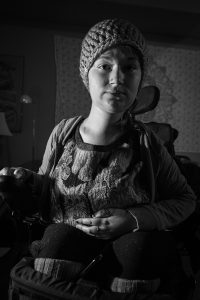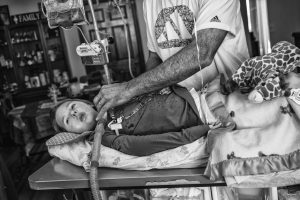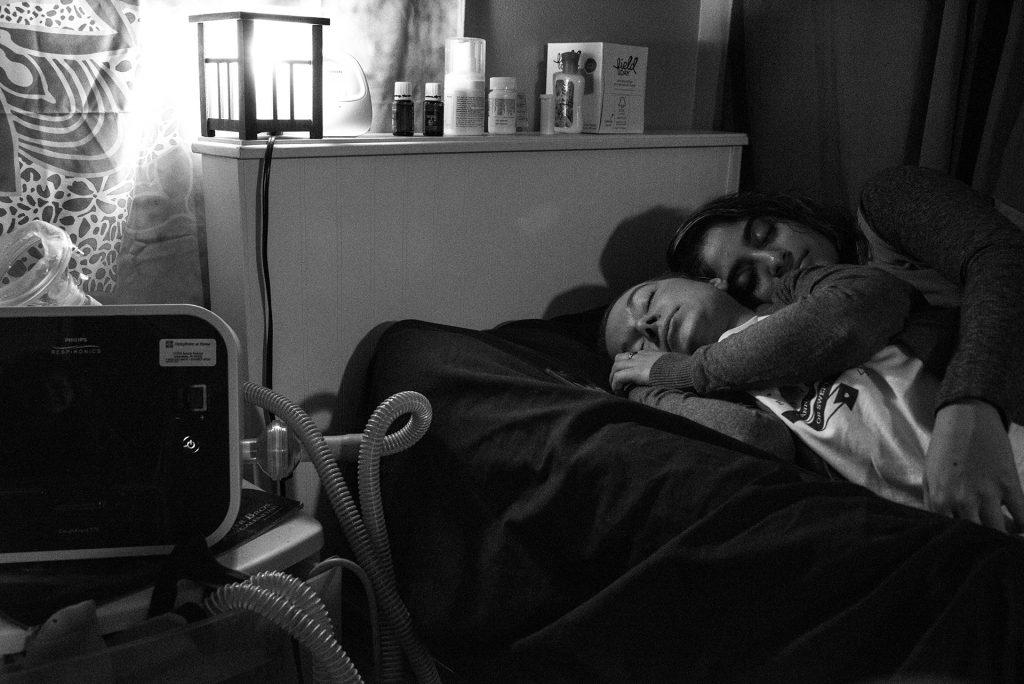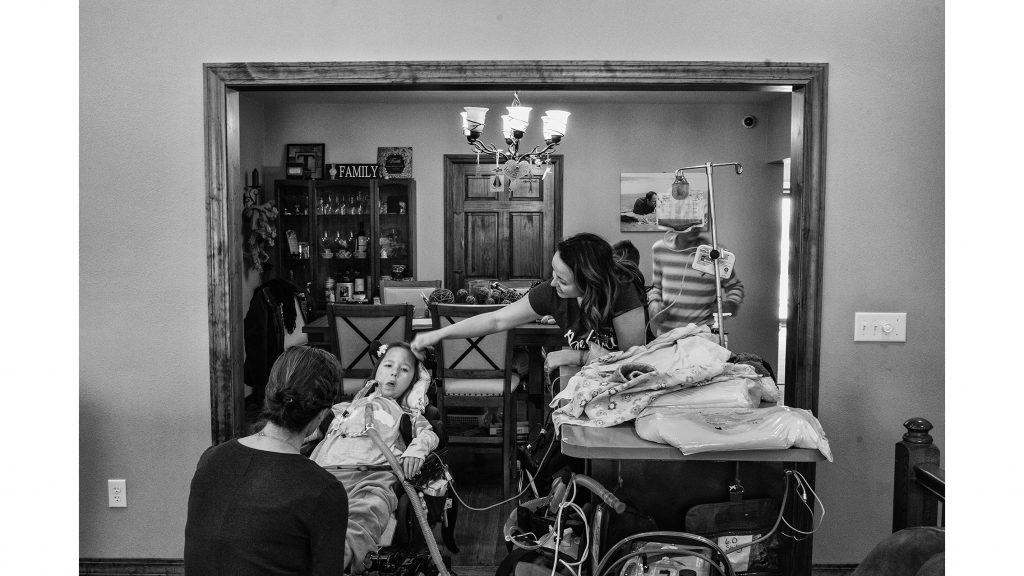This is the story of two Iowa women who have neuromuscular disorder spinal muscular atrophy and live 88 miles apart; they have known each other for a decade. SMA is the leading cause of death in infants, and, working from statistics, health officials estimate that 1 in 10,000 live births are affected.

Hannah Soyer, 23, is a recent graduate of the University of Iowa and former Opinions editor at The Daily Iowan. She maintains her independence by hiring friends to assist her in daily tasks such as showering, cooking, and getting dressed. Stella Turnbull, 11, lives in Pella, Iowa, and is undergoing medical treatment for SMA. She does not have the ability to speak and has a very limited use of her muscles. This story is a window into their lives.
Hannah stares at cardboard, packing tape, and box-cutter blades on the floor of her single bedroom apartment in Iowa City. Inside the cardboard box sits a new Permobil power wheelchair. It’s a replacement for a well-used Cash, the nickname she coined for her current chair edging into its final months of a seven-year run.
“I know being a queen is hard,” says Phic Lovan of National Seating and Mobility as he assembles the new chair. “Setting up her throne is hard, too.”
She rolls her eyes.
In Pella, Stella feels the delicate pokes of bimonthly physical therapy. In an attempt to measure her strength, the in-home therapist moves Stella’s hands and feet.
Hannah and Stella met 10 years ago at the annual Beaverdash in Beaverdale, Iowa. The event, hosted by Cure SMA, is a fundraiser to fight the disease.
Currently, they are both at a crossroads.
Their families suggest health-care providers are more inhibiting than enabling.
For Hannah, Cash will only last so long. With her primary insurer refusing to cover an updated model of the current chair, it is uncertain whether she will be able to find a compatible replacement.
While Hannah’s search continues, Stella undergoes treatment for the only FDA-approved medication for SMA, Spinraza.
The medication, approved in December 2016, shows promise in halting progression of the disease as well as in improving the motor function of infants who were diagnosed before 6 months old.

Spinraza costs between $625,000 and $750,000 per year, which pitted the Turnbull family in a yearlong battle with insurers over who should cover the cost.
“It’s the absolute worst feeling in the entire world,” said Stella’s mother, Sarah. “We’ve had to stand up for our child, saying her life is worth living.”
The Turnbull family acreage near Pella sits on a vast piece of land stretching across the rolling hills of rural Iowa. Stella’s brother, Sayer, practices football outside while the rest of the family watches from the front yard.
Using slight movements of her fingers, Stella independently navigates her wheelchair across the concrete driveway. Her finger strength has improved over the past couple of months, Sarah says.
“We really have seen that it is working,” she said. “But is it enough to sell it to insurance?”
Though nonverbal, Stella has the ability to communicate through the use of a device that reads eye movement. Simple phrases such as her name, yes and no, and her favorite foods are programmed responses that enable her to indicate what she would like to say.
Stella’s strength perseveres through the constant medical complications in her life. Whether she’s dealing with a fungal infection in her finger at home or receiving a dose of Spinraza in the hospital, Stella’s eyes show a resilience that only a photograph could portray.
While Stella has limited verbal communication, the same cannot be said for Hannah.
With both an incredible sense of humor and an intense awareness of the world around her, the 23-year-old has accomplished great strides.

In addition to her crowning as Ms. Wheelchair Iowa 2017, in February, Hannah published a 1,000-word story in Cosmopolitan on the subject of sex and disability.
Whether she is enjoying Iowa City’s finer eats with close friends or resting in her bedroom at home, she always finds a way to introduce laughter into conversation.
The subject of personal identity is integral to Hannah’s nature. She is both a close friend of and fierce advocate for those with disabilities across the country.
After years of writing on the subject of “ableism” in the modern media, Hannah will be the first to tell you that she is neither a victim nor a host of a pity party.
“I feel much less disabled when I’m in my wheelchair than when I’m out of it,” she said.
For Hannah and Stella, there are decisions in the foreseeable future that will have great impact on their lives.
Come April 27, Stella will receive this year’s final dose of Spinraza. At five doses in fewer than six months, she’s endured countless trips to Iowa City and Madison, Wisconsin, for medical consultation and treatment.
Following the final, or maintenance dose, she will undergo a physical-therapy evaluation to determine whether the medication has halted progression of the disorder.
Sarah is quite hopeful for a positive evaluation, providing the family with another year of insurance coverage for the expensive treatment.
Meanwhile, Hannah has yet to make up her mind on whether she will pursue the Spinraza route.
Clinical trials of the medication were primarily offered to patients ranging between toddler and preteen years. At 23, Hannah does not know what the side effects of the drug at her age might be.

After having been accepted to the University of Kansas and University of Missouri-Kansas City for graduate school, she is also unsure of whether the surgical process will require an extensive recovery period.
Both graduate schools offer her a full-ride scholarship to study and teach. After years of extensive work, Hannah has earned her right to reach beyond the limits of Iowa City and the University of Iowa.
But pursuing Spinraza is still up in the air, she said.
“I told myself I wasn’t going to do it, and I told other people I wasn’t going to do it,” she said. “What would be really great is if I went back on my word. There’s something very powerful in that.”










